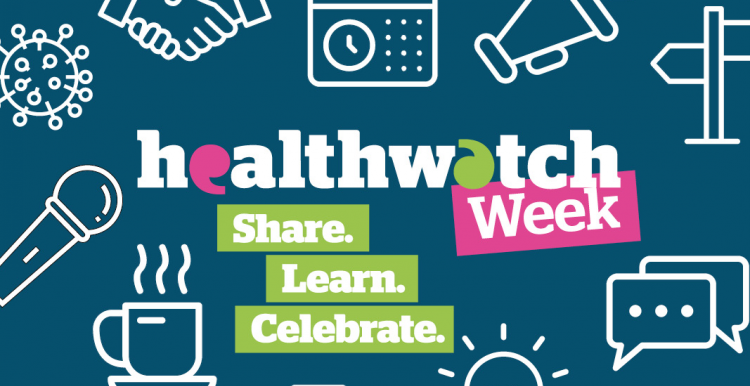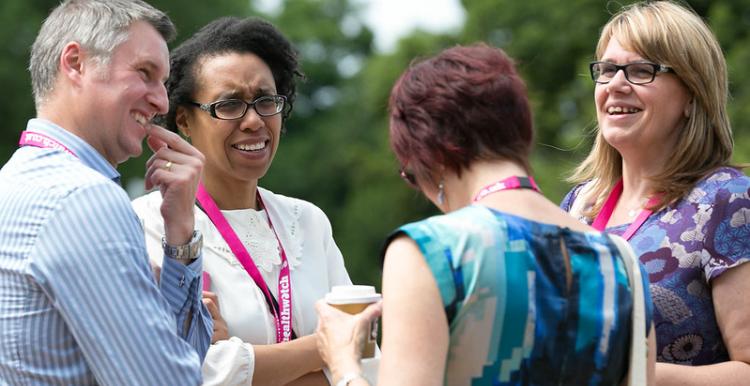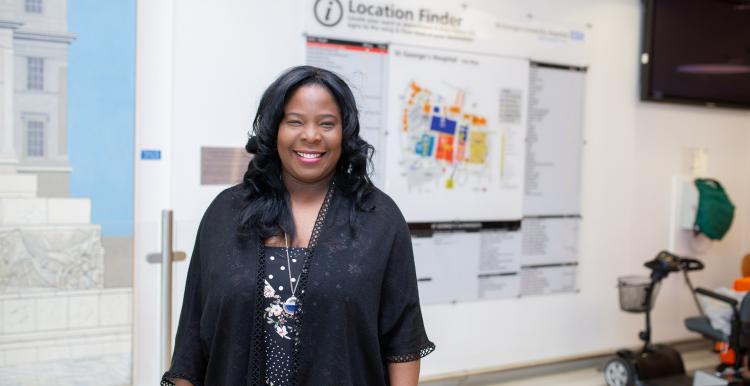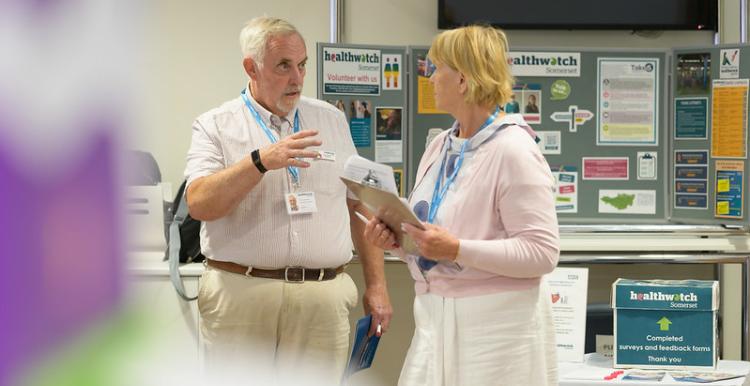Your story: The difference the Quality Framework made – immediate results and one year on.
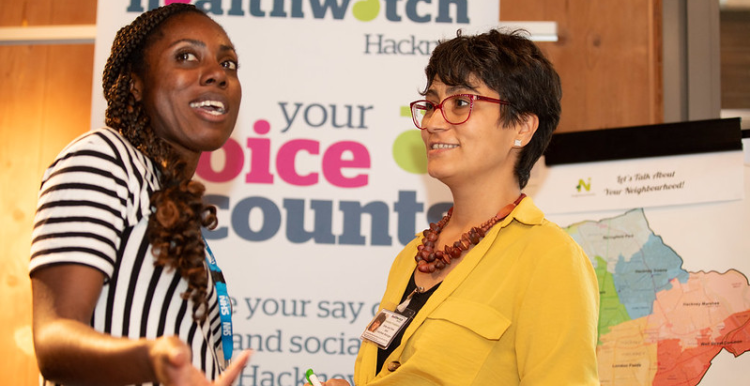
Many of you have already used the Quality Framework with our support, working with staff and volunteers to review six key domains that apply to every local Healthwatch.
Healthwatch Haringey has worked with Healthwatch England on the development of the Quality Framework since the beginning. Here they share more about their approach and immediate and longer-term benefits.
What are the six domains of the Quality Framework?
- Leadership and decision-making
- People
- Sustainability and resilience
- Collaboration
- Engagement, involvement and reach
- Influence and impact.
What made you want to use the Quality Framework?
We have helped with the work to develop the Quality Framework from the start, so we were already aware of the benefits it could bring.
We volunteered to be one of the early adopters of the Quality Framework for several reasons:
- Contract renewal: Our contract was coming to an end, and we felt that the Quality Framework was an excellent way for us to assess our current performance and would help us to gather evidence of effectiveness and impact to inform upcoming contract negotiations.
- Continuous improvement: We wanted to pause and reflect on where we were and better understand where we needed to focus our efforts in the future to increase our effectiveness and strengthen our impact.
- Board involvement: Our Board members had engaged with developing the Quality Framework and had found it helpful and wanted to continue their participation. We also saw this as an opportunity to get Board members re-energised about our work.
- Benefits to host organisation: Healthwatch Haringey is one of a range of contracts delivered by Public Voice CIC. Board members and staff found the Quality Framework very useful for assessing the effectiveness and impact of our organisation. The parent company or host organisation can use the Quality Framework to evaluate their performance in addition to local Healthwatch.
Who did you involve, and how long did it take?
Investing the time and effort in fully completing the Quality Framework was essential to us as we knew it would help us reflect on what we did well and what we needed to improve and, in the longer term, enhance the effectiveness and impact of our work.
The more time and effort you put in, the more you get out of the process, and the more valuable it is to your Healthwatch.
Whilst completing the Quality Framework involves the whole team, we felt there needed to be one person leading and coordinating the process – someone who had a good overview of our full range and depth of work.
Our Research and Engagement Manager led the process, coordinated the whole team’s input, and completed the documentation.
It took us three months to complete the Quality Framework from start to finish in and around our day-to-day work. As we were piloting the Quality Framework process for Healthwatch England, we set a strict deadline for completion.
How did you involve people in the process?
We decided to gather people’s input collectively through workshops and individually through interviews.
The workshops
We ran two workshops, one for Healthwatch Haringey staff and one for board members.
The workshops allowed us to have a robust discussion and arrive at a collective view on how we were doing on each of the six domains, identify our strengths, and agree and prioritise our areas for improvement.
This information was then taken and put into the Quality Framework spreadsheet.
If we were doing it now and had more flexibility around timescales, we would hold two additional workshops – one for volunteers and one for partners and stakeholders - following the same process as for the two workshops we had.
Staff interviews
We then had 1-2-1 interviews with all staff members to provide more detailed information about their specific work areas.
These were essential for answering specific questions against each domain and provided additional beneficial information.
Doing this helped us validate the discussions we had at the workshops, gather evidence for the strengths we had highlighted, and give us creative ideas for the areas for improvement we had identified. They ensured our Quality Framework was evidence-based and robust.
How did Healthwatch England support you during this process?
Our Regional Manager, Alvin Kinch, reviewed our Quality Framework submission and provided detailed feedback on how we could improve and strengthen it, sharing ideas and good practice from elsewhere, ensuring we got the most out of the process.
What changes did you see?
We set out three areas for improvement for the coming year, with a clear focus on what we would be doing differently to make these improvements happen. From this process, we found several immediate and longer-term benefits.
Immediate benefits
- Open and honest discussions with our Commissioner
We used the insight gained from the process to inform our discussions with our Commissioner, highlighting our strengths and being open about areas for development and improvement plans. - Stability and security from new contract
We were awarded the Healthwatch Haringey contract for a new three-year term, with a contract value almost the same as previous years, despite local authority budgets facing cuts. Our contract renewal for three more years gives us a level of security, knowing we have a stable and reliable income stream. - Improved teamwork
Working as a whole team and collectively reviewing our strengths and weaknesses helped build team relationships, improve communication, and boost team morale. Staff valued taking time out from their daily tasks to pause, reflect and take stock. We now meet monthly to ensure that we have a clear overview of our work, allowing everyone to help shape priorities and work plans for the coming year. - Re-engaging our Board
Our board members are responsible for delivering a broad portfolio of contracts, not just Healthwatch Haringey. Going through the Quality Framework process helped us re-engage board members in our work and helped shape our plans for the coming year. - Strengthening our annual report
The Quality Framework made us focus on the impact of our work. This provided a wealth of information that we could use in our Annual Report highlighting changes and improvements we had helped to deliver to our community.
Benefits one year on:
One year after completing the Quality Framework, we met with our Healthwatch England Regional Manager to see what impact this had made. We found that we had:
- Improved how we work with our neighbouring Healthwatch
Monthly meetings with the five local Healthwatch in North Central London have been invaluable in improving communication, identifying common themes and challenges, learning from each other and increasing our impact. We’re now working on our first joint project together. - Improved how we work with Healthwatch England
More of our staff are attending events and training put on by Healthwatch England. We’re also engaging more on joint work with Healthwatch England and have learnt a lot through doing this. - Renewed our energy and focus on reaching out to our diverse communities
We’ve focused on building longer-term relationships with more of the diverse communities in Haringey. Over the last year, we’ve developed excellent working relationships with our Turkish and Kurdish communities. We’re now looking at ways we can create similar relationships with Black African communities in Haringey. - Moved to a more outcomes-based approach to better understand our influence and impact
We now invest much more time and energy in follow-up after we’ve published a report. We make sure our work leads to tangible improvements and change based on what the public tells us. Through this focus on outcomes, it is much easier to assess and evidence the effectiveness of our work. - Improved how we communicate with partners, stakeholders and the public
We have invested more staff time in Communications over the past year and have become much better at shouting about our successes and informing people of the difference we’re making.
We regularly update our website with what we’re working on and the outcomes of that work and send a monthly newsletter brimming with content that fully reflects the range and variety of our work.
Top tips for success
- Invest staff time and effort in completing the Quality Framework fully. The more you put in, the more you get out!
- Involve the wider Healthwatch team in the self-assessment process, including Healthwatch staff, Board members, volunteers, and partners and stakeholders
- Appoint someone to lead and coordinate the process. The lead needs to have a good overview of the full range of your work.
- Work through the Quality Framework as a team, as this strengthens team-working and communications.
- Ask your Healthwatch England Regional Manager to review your return and provide you with feedback. They can be very helpful, acting as a critical friend and sharing ideas and good practice from elsewhere.
- Choose two or three priority areas of improvement for your Action Plan and focus your efforts on making a difference on those in the coming year.
- Revisit your Action Plan one year on and document how completing the Quality Framework has helped you increase your effectiveness and strengthen the impact of your work.

